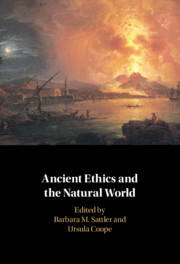Book contents
- Ancient Ethics and the Natural World
- Ancient Ethics and the Natural World
- Copyright page
- Dedication
- Contents
- Contributors
- Note on the Editors
- Introduction
- Part I Humans in Nature: Nature and Law, Humans and Natural Catastrophes
- Chapter 1 Legislating in Accordance with Nature in Plato’s Laws
- Chapter 2 Astronomy and Moral History in Plato’s Timaeus
- Chapter 3 Natural Catastrophe in Greek and Roman Philosophy
- Part II Humans as Godlike, Gods as Humanlike: Presocratics and Platonists
- Part III Emotions, Reason, and the Natural World (Aristotle)
- Part IV Action and the Natural World (Aristotle)
- Part V The Naturalness of Goodness
- Bibliography
- Index Locorum
- General Index
Chapter 1 - Legislating in Accordance with Nature in Plato’s Laws
from Part I - Humans in Nature: Nature and Law, Humans and Natural Catastrophes
Published online by Cambridge University Press: 13 August 2021
- Ancient Ethics and the Natural World
- Ancient Ethics and the Natural World
- Copyright page
- Dedication
- Contents
- Contributors
- Note on the Editors
- Introduction
- Part I Humans in Nature: Nature and Law, Humans and Natural Catastrophes
- Chapter 1 Legislating in Accordance with Nature in Plato’s Laws
- Chapter 2 Astronomy and Moral History in Plato’s Timaeus
- Chapter 3 Natural Catastrophe in Greek and Roman Philosophy
- Part II Humans as Godlike, Gods as Humanlike: Presocratics and Platonists
- Part III Emotions, Reason, and the Natural World (Aristotle)
- Part IV Action and the Natural World (Aristotle)
- Part V The Naturalness of Goodness
- Bibliography
- Index Locorum
- General Index
Summary
This chapter looks at Plato’s take on the nomos-phusis antithesis in his Laws. He argues that the goal of the Laws, of legislating in accordance with nature, should be distinguished from the much-studied idea of 'natural law' in two ways. First, in the relevant parts of the Laws, the focus is primarily the right way to conduct an activity, legislation, rather than its product (laws or law). Secondly, the Laws draws a comparison with other specialised or technical activities that can be performed well or badly, such as medicine or building. Legislation is natural, among other things, when it is undertaken in a certain ‘natural’ order, from the starting point of life to death. This order ensures that no stage of life is ignored during the legislative process and thus guarantees its comprehensiveness. Plato’s comparison between the legislator and other craftsmen presents a view of natural procedure within an art or profession: the craftsman is not subjected to constraints that are external to the subject matter and he is able to give full attention to the objectives and questions that belong to his craft. Finally, the legislation considered here is ‘natural’ without being underpinned by theology.
- Type
- Chapter
- Information
- Ancient Ethics and the Natural World , pp. 15 - 31Publisher: Cambridge University PressPrint publication year: 2021
- 1
- Cited by



